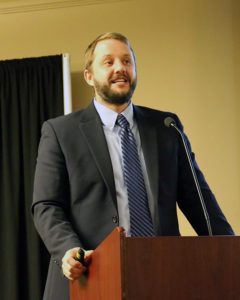Christ’s followers must “make space” for people who hold deeply different views—not only in the public square, but also at the table of fellowship, a Christian ethicist told a crowd at Howard Payne University.
Matthew Kaemingk, assistant professor of Christian ethics at Fuller Theological Seminary and associate dean of Fuller’s Houston-area campus, delivered the 12th annual Currie-Strickland Distinguished Lectures in Christian Ethics, focusing particularly on Muslim immigration.
Too often, Christians follow the politics of the left or the right and then “sprinkle Jesus on top of their political platforms,” rather than allowing their views to be shaped by Christ, said Kaemingk, author of Christian Hospitality and Muslim Immigration in the Age of Fear and a fellow in the Center for Public Justice.

Millions of Muslims have immigrated to Europe and North America in the past five decades, sparking a wide range of debates, he observed.
“With every single terrorist attack and every new war and every new controversy, the debates about Muslim immigration become more and more heated, more and more complex, and more and more difficult for everyday Christians to navigate,” he said, challenging followers of Jesus to view the issue through “the lens” of Christ.
Since Europe has a longer history of dealing with the issue of Muslim immigration than the United States, he suggested examining the successes and failures of European experience.
‘High walls’ or ‘open doors’
Kaemingk, who conducted extensive research in Amsterdam, noted two disparate responses in Europe to Muslim immigration—“high walls” or “open doors.”
Proponents of “high walls” typically have addressed the issue in terms of restrictions, security, national identity and forceful assimilation. Advocates of “open doors” have adopted an often-paternalistic posture, promoting government aid, multiculturalism and soft assimilation.
In spite of sharp differences, both camps have looked to government for the solution to the perceived problem of Muslims, he observed.
Sign up for our weekly edition and get all our headlines in your inbox on Thursdays
“Muslims are always framed as a problem to be solved, a question to be answered, a challenge to be overcome, and you look to the state to fix these people who are different from us” by making them more like the majority population, he said.
Instead of looking at walls and doors, Kaemingk urged Christians to consider tables—places where followers of Jesus offer hospitality and fellowship to “people who are deeply different than us.”
“As globalization churns, we are going to be encountering more and more difference, and that difference is going to be deep—deeper than we could imagine—and it is going to be close, and it is going to be moving at us quickly,” he said.
“So one of the core questions for Christian ethics in this new century is: How do we handle difference? Do we have a Christian ethic of hospitality that can endure deep, deep difference?”
‘Generous public space’
Historic Christian responses to religious diversity—domination, retreat, moderation and assimilation—each presented their own sets of problems, he said.
As an alternative, Kaemingk pointed positively to the Christian pluralism of Abraham Kuyper, a 19th-century Dutch pastor/theologian.
Summarizing Kuyper’s view, Kaemingk said, “We make space for those we disagree with, not because we think principles don’t matter, but because we think our principles demand that we make space for others.”
Kuyper’s view calls for “generous public space” where various faiths can be lived out—a marketplace of ideas where faiths can compete freely for adherents, Kaemingk explained.
Belief in the sovereignty of Christ alone requires Christians to recognize the state has no right to dictate how people respond to God, he asserted. Furthermore, when Christians try to exercise that authority over others, they claim for themselves a crown that belongs only to Christ, he added.
But abstract theology is not enough, because when the political rhetoric of fear grows, “theology gets thrown out the window,” he asserted.
“When Twin Towers fall, does our theology of religious liberty fall with it?” he asked.
Invitation to radical hospitality
In times of fear, the example of Jesus in the Garden of Gethsemane offers instruction to Christians, Kaemingk said. Jesus rebuked those who took up the sword and instead granted healing to the slave of the high priest.
Christians also need to reckon with the reality that when Christ was stripped of his robe before his crucifixion, it actually was the violence, hatred and fear within all people that was exposed, he added.
“We have something very important in common with our Muslim neighbors. It’s our sin. It’s our need for a Savior,” he said.
Finally, Jesus modeled radical hospitality, Kaemingk asserted. Christ welcomed those who would betray him to his Last Supper, and he shared a meal after his resurrection with those who had forsaken him.
“We encounter a God of hospitality—a God who makes space in a world filled with violence and fear,” he said.
The cross of Christ compels Christians to take the next step beyond law and justice by extending hospitality to people across deep differences, Kaemingk insisted.
“If Christ made space for us at the table, we must go out and embody that space-making, that hospitality for others,” he said.















We seek to connect God’s story and God’s people around the world. To learn more about God’s story, click here.
Send comments and feedback to Eric Black, our editor. For comments to be published, please specify “letter to the editor.” Maximum length for publication is 300 words.